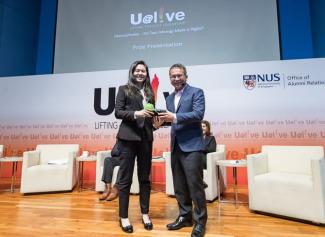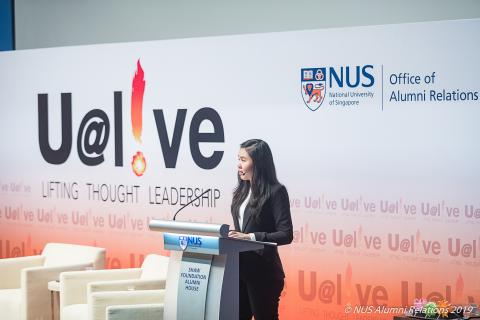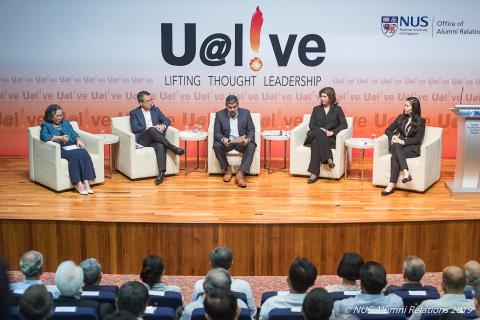
SMU’s second year social sciences student Victoria Ivory Birrell emerged as the top student winner for the National University of Singapore (NUS) U@Live 2019 essay competition on the set topic “Islamophobia – Do Two Wrongs Make a Right?”.
This is the second NUS U@Live competition held this year and it was open to all students of Singapore universities and polytechnics, as well as NUS alumni. Victoria’s 1000-word essay, which offered honest and bold ideas, was the top student essay out of 63 submissions.
Victoria’s essay was on how global prejudice against Islam and the subjugation of Muslims is manifestly unjust. She argued that Islamophobia nourishes Radical Islam’s anti-West sentiment and ideology, explaining how both Islamophobia and Islamic radicalism share the similarity of thriving on fearmongering by relying on grossly unsubstantiated mistruths about the other. Victoria proposed that a more sophisticated understanding of Muslims and Islam will raise greater public awareness about the insidious consequences of Islamophobic beliefs and rhetoric, both of which are never justified. She also emphasised that “constantly educating ourselves and being actively critical of our own prejudices is paramount towards shaping a far more inclusive world where Muslims can feel safe, respected and valued”. You can read her full essay in the attached file below.
On why she chose to join this competition, Victoria said, “I was compelled to participate in this essay competition because of the pertinence of the topic. Islamophobia has been on a rapid rise internationally. What is most problematic is that it is so pervasive in the global political and social realm. Thus, I saw the competition as a rare opportunity to share my student perspective on such a relevant topic whilst applying the knowledge and analytical thinking skills honed from my interdisciplinary degree in Politics, Law and Economics (PLE) at SMU.
Being informed of my win was a completely euphoric feeling. I was excited to be able to listen to and speak alongside the distinguished panellists. I was also elated to represent SMU again at such a prestigious event. I do plan to participate in more writing competitions.”


On 30 October at the NUS Shaw Foundation Alumni House Auditorium, Victoria presented her essay to an audience of nearly 900 (including those who watched the event’s live stream). She was also a panellist alongside Mr Edwin Tong, Senior Minister of State for Law and Health, Ms Farah Pandith, Former US Government’s Special Representative to Muslim Communities and Associate Professor Maznah Mohamad, Head of Malay Studies Department and Academic Lead, NUS. The session was moderated by Mr Viswa Sadasivan, Chief Executive Officer of Strategic Moves Pte Ltd and a former Nominated Member of Parliament.
At the panel discussion, Victoria spoke about her thoughts on Islamaophibia and how we should combat it. She said that, “it has gotten to a point where Muslims just want to be seen as a human being first and foremost. My Muslim friends are proud of their identity, race and religion but unfortunately, when they identify as being a Muslim, to the external world it is wrapped up in this stigma that is just not an accurate reflection of who they are. The divisive issue of Islamophobia will not abate by itself. We need to have this conversation of combating Islamophobia; in Singapore, we are very fortunate that our government has maintained religious harmony but complacency towards fighting Islamophobia is just as dangerous. You do not want to be numb or blind towards Islamophobia creeping back in.
Passivity is not the way you solve Islamophobia. Singapore updating its Maintenance of Religious Harmony Act is a powerful signpost that the nation will not stand for this kind of discrimination. We need more useful, reasoned and open discussion like this. Being more critical and challenging yourself to truly think about what you are reading, do not be too quick to believe, use basic human reasoning to ensure you are not endorsing a mistrust.”
She also shared that her key takeaway was from Ms Farah Pandith’s vital point that we needed to stop being lazy with hate, “We must first actively ask ourselves what kind of world we want to live in. Second, we must ask what we as individuals are doing to make the world what you want it to be. We must actively shape a kinder and better world as well as being critical of the torrent of information we read on a daily basis, as fake news can very easily interfere with how we perceive and treat certain races and/or religions if we passively accept mistruths.”
For her win, Victoria would like to credit her parents for always being there for her. She also added that she would like to thank her Management Communication professor Sumathi Krishna, whose classes “taught me how to enhance the persuasiveness, clarity and coherence of my argumentation. In addition, Prof Krishna was so supportive of me for wanting to compete in this competition.”
Earlier this year, Victoria had also taken the top spot at the New York Times Asia-Pacific Writing Competition in the tertiary category for her essay “Ignore the Fluff, Technology hasn’t failed us and here’s why”. You can read about it here.
Congratulations once again, Victoria!
[Featured photo: Victoria Ivory Birrell, SMU social sciences student received her prize from Mr Edwin Tong, Senior Minister of State for Law at the NUS U@Live event held at Shaw Foundation Alumni House Auditorium]
Photo Credits: Courtesy of NUS Alumni Relations 2019